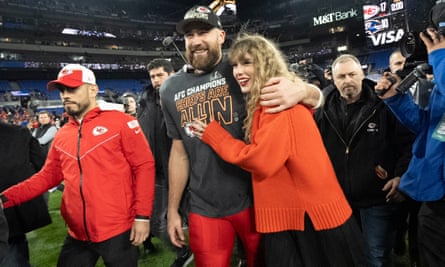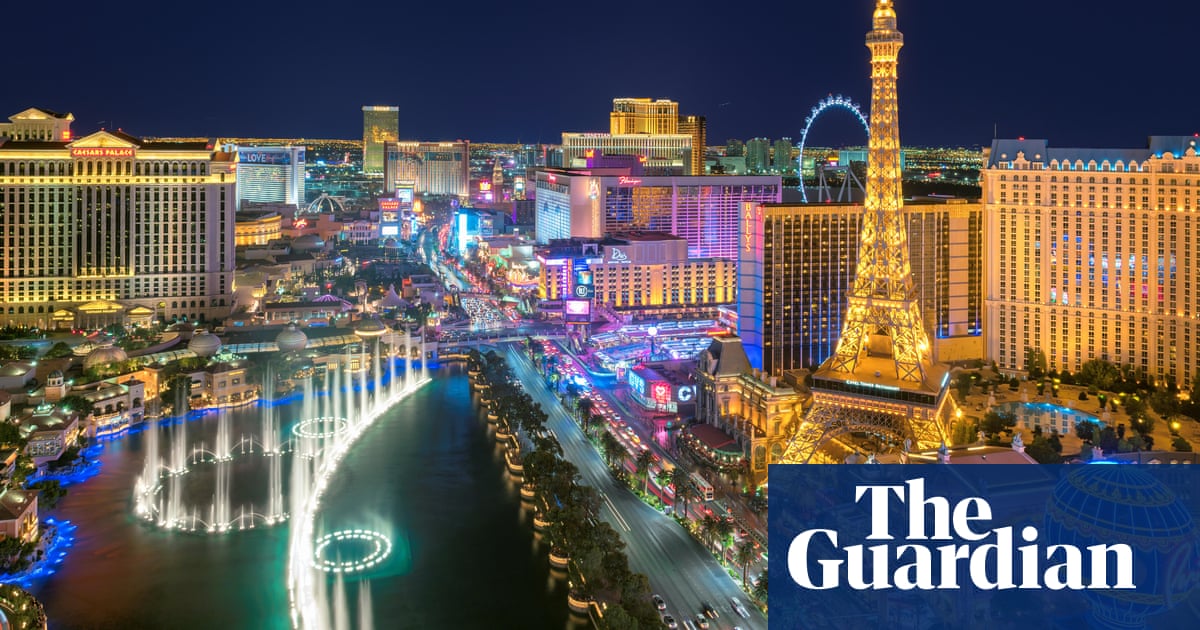
The Super Bowl and gambling are locked in a tight and dangerous embrace
Americans will stake $23bn on Sunday’s game as the NFL strengthens its ties with the gambling industry. Many are worried about the human costs
For the first time, this year’s Super Bowl will take place in Las Vegas. And NFL commissioner Roger Goodell is aware that a gambling mecca and pro sports teams could be a dangerous mixture: he issued a memo in the run-up to Sunday’s game, reminding team personnel they should not even walk into a sportsbook, let alone place a bet on the game.
For the general public it’s a very different story. The clash between the Kansas City Chiefs and the San Francisco 49ers is expected to be the biggest single-game betting event in US history. The American Gaming Association (AGA) expects 26% of US adults will bet on the game for a combined total of $23bn. That’s no surprise given the magnitude of the occasion and the explosive growth of the sector since a 2018 US supreme court ruling cleared the path for regulated sports gambling beyond Nevada.
It’s now available in 38 states, Washington DC and Puerto Rico. More than $300bn has been legally wagered on sports in the US since the 2018 ruling, with $79bn bet in the first nine months of 2023. That represents a 33% increase from last year according to the AGA. And the two most populous states, California and Texas, are yet to get on board.
In 2003 – and for the 16 years afterwards – the NFL notoriously refused to allow Las Vegas tourism promoters to run television advertisements during the Super Bowl on the basis that the What Happens Here, Stays Here campaign encouraged gambling. In 2015, the league banned the then-Dallas Cowboys quarterback Tony Romo from hosting a fantasy football convention in a building linked to a Vegas casino. Even in 2017, when NFL owners voted to allow the Oakland Raiders to relocate to Nevada, Goodell insisted that “we still strongly oppose legalised sports gambling” on the basis it poses a threat to the competition’s integrity.
But the league swiftly pivoted when the 2018 verdict raised the stakes. Last year’s Super Bowl in Arizona was the first in a state with legalised sports betting. Next year’s will be in gaming-friendly New Orleans at the Caesars Superdome, an arena sponsored by a casino company.
The NFL, which occasionally punishes players for violating its strict gambling policy, is trying to reconcile the emergence of a lucrative and popular revenue stream with its history of institutional squeamishness based on fears of reputational damage from possible result-fixing.
Players could be forgiven for feeling disoriented. In 2022 the Raiders wide receiver Davante Adams became a brand ambassador for a casino operator that also partnered with the franchise. Yet last year the NFL toughened its gambling policy to raise the suspension from one to two years for a player betting on his own team.
The NFL said last week that it has trained more than 17,000 personnel on the rules. In 2021, the year it agreed partnership deals worth nearly $1bn with three sportsbooks, it donated $6.2m to the National Council on Problem Gambling, a neutral advocacy and awareness organisation.
David Highhill, the NFL’s general manager of sports betting, told reporters that only three sports betting commercials will air during Sunday’s Super Bowl broadcast, while during the season fewer than 5% of in-game advertisements are for sports gambling. It probably doesn’t feel that way to many viewers given the abundance of gambling chat, statistics and promotions that now pervades sports media.
On Sunday, ESPN published a lengthy feature about the NFL’s shifting stance towards sports betting. Meanwhile, on the broadcaster’s app, the story was surrounded by links to analysis and advice articles for gamblers and a link to the ESPN BET sportsbook is prominently placed just below the latest scores on ESPN.com. Last year ESPN agreed a $2bn deal with a gaming company, Penn Entertainment, to launch the branded sportsbook.
As with Goodell and the NFL, the move was a rapid about-face for the Disney-owned network. The Disney CEO Bob Iger said in 2019 that he did not anticipate the parent company “facilitating gambling in any way.” But Americans legally wagered over $100bn on sports last year – up from $13bn in 2019 – and ESPN is the biggest name in sports broadcasting. “This isn’t something that ESPN wants to do,” Jay Snowden, the Penn CEO and president, said at a 2023 conference. “This is something that ESPN has to do, because sports fans are demanding it.”
These days, odds and lines are routine content, almost as easy to spot as standings and scorelines. “It’s become so commonplace in our society and it’s celebrated,” says Patrick Chester, who was seriously addicted to gambling for about 15 years and now tells his story to college athletes, among other audiences, in educational sessions.
“We celebrate March Madness, we celebrate the Super Bowl and there’s betting and gambling all around that so it’s just become ingrained in our society that that’s just what we do, we watch a sporting event and we have to have action on it because it adds that much more excitement to the game.”
A 51-year-old former general contractor from Washington state, Chester owed more than $1m at the time of his final bet: $45,000 on the Seattle Seahawks to win the 2015 Super Bowl. He had borrowed more than $30,000 under false pretenses from his brother-in-law, who was sat next to him in the stadium in Glendale, Arizona, as the Seahawks agonisingly lost 28-24 to the New England Patriots.

“The very next day I’m sitting in the airport with my wife, making plans to end my life by suicide, that’s where I was at,” he says. “While we were out of town in Arizona at the game a family member discovered I had a gambling problem so when I got home my family had put together an intervention for me, literally the day after we got home, and that saved my life because I was put on a plane and sent off to treatment. Had that not happened I’d have been dead.”
Some problem-gambling educators caution that the US is unprepared for the consequences of the dramatic surge in bettors amid ever-easier access from mobile technology, extensive exposure in mainstream media and endorsements from major leagues and star players. Not to mention shrewd marketing; some sportsbooks are offering Taylor Swift-themed Super Bowl propositions.
“There will be people that have never gambled before that will place a bet on this game because it’s the Super Bowl and then wind up having a problem down the road. Not all of them, not most of them, but some of them,” Chester says.
“They don’t know the ramifications, they don’t know the warning signs, they don’t know there could be a problem, they don’t know that gambling addiction is even a thing. That’s consistent with just about everybody that I’ve come across, even myself, that have had issues. We have no idea while we’re in it what’s happening and that it could get out of control if we’re not careful.”
Dan Trolaro, US vice-president of prevention at Epic Global Solutions, a gambling harm consultancy that is neutral on betting, says that young people are realising that betting is readily accessible. “You have a casino and a sportsbook in your pocket 24 hours a day,” he says. The Super Bowl, he adds, is “a betting buffet, essentially – but technology has allowed there to be a betting buffet in almost every sport on every night of the week now.”
Rob Minnick, a 24-year-old recovering gambler from New Jersey who creates content to help others, struggled with addiction for six years and would place a variety of wagers for six to eight hours a day. He began playing daily fantasy sports aged 18.
“The velocity of play has increased and the barriers to entry have decreased. If you go to a fantasy sports app you’re always one click away from a sportsbook and one click away from the casino and once you’re in they basically provide offers to draw you in to the more addictive forms of play to keep you coming back,” he says. “It’s getting very separate from a love of the game and more connected to ‘how much money can I make watching this?’ I think it’s bad for sports in general.”
Prominent services such as ESPN BET stress their commitment to industry-standard policies that encourage responsible gaming, while the NBA, NHL and MLB last year helped produce an advertisement urging supporters to bet responsibly. Still, holding the Super Bowl in Las Vegas underlines that gambling and sports, once at arm’s length, are now clasped in a tight embrace that could have profound consequences for younger generations in particular.
“Research has shown that early exposure to gambling increases the risk of developing a gambling problem later in life,” the National Council on Problem Gambling said in a statement. “NCPG believes that as media companies increasingly integrate gambling content there is the potential for additional risk, particularly in the increased promotion of sports gambling to young people and perhaps an expectation that sports and betting go hand in hand … As sports media companies continue to integrate gambling-related content, we strongly encourage them to develop and promote innovative, responsible gambling messages in equal measure.”
One proposal by federal lawmakers to use tax revenue to fund treatment, prevention and research faces resistance from the industry. “States have passed all of this legalisation without really having any kind of framework in place for prevention, for education,” says Lia Nower, distinguished professor and director of the Center for Gambling Studies at Rutgers University.
“Schools that have programmes to target drugs, cigarettes, vaping, they have no programmes to educate kids about problem gambling. Same thing with emergency rooms, family physicians, child welfare agencies, juvenile court system – no place screens for gambling at parity with substance-abuse disorders or has any kind of framework to triage people early for treatment.”
Meanwhile, as the Chiefs and 49ers prepare in Vegas – or, rather, in a quiet resort far from the temptations of the Strip – the money and the mixed messages keep flowing. Last week the basketball superstar LeBron James signed with the fantasy sports and betting giants DraftKings to provide weekly picks. But since NBA rules prevent active players from wagering on the league, he’ll offer his insights on the NFL.
In the US, call the National Council on Problem Gambling at 800-GAMBLER or text 800GAM. In the UK, support for problem gambling can be found via the NHS National Problem Gambling Clinic on 020 7381 7722, or GamCare on 0808 8020 133. In Australia, Gambling Help Online is available on 1800 858 858 and the National Debt Helpline is at 1800 007 007
- Super Bowl
- The big bet
- NFL
- Gambling
- US sports
- features
